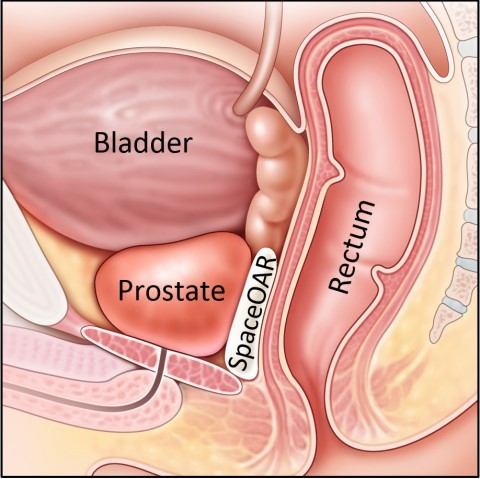BEDFORD, Mass.--(BUSINESS WIRE)--Augmenix, Inc., a medical technology company that develops, manufactures and sells proprietary absorbable hydrogels that separate and protect organs at risk during radiotherapy, today announced positive results from the first prospective clinical trial evaluating the efficacy of its SpaceOAR® System in protecting the rectum in men undergoing high dose stereotactic body radiation therapy (SBRT*) for the treatment of low- to intermediate-risk prostate cancer. Results from the multi-institutional Phase 2 study were presented today as a late-breaking clinical trial at the 59th Annual Meeting of the American Society for Radiation Oncology (ASTRO 2017) in San Diego.
Researchers have long known that higher radiation doses (dose escalation) are more effective at killing tumors. However, the amount of radiation safely delivered to the prostate is limited by the rectum proximity, and concerns of creating long-term rectal injury and associated side effects. Physicians at the University of Texas Southwestern Medical Center and Memorial Sloan Kettering Cancer Center recently evaluated 44 men receiving SpaceOAR Hydrogel followed by dose-escalated (45 Gray) SBRT. The data show that SpaceOAR Hydrogel significantly reduces rectal injury in men undergoing high-dose SBRT for prostate cancer. Specifically, 13.6 percent of treated men had rectal mucosal injury in the study, all of which were mildly symptomatic and completely healed within six months following treatment. These findings are significant, as prior clinical research found that 90 percent of non-SpaceOAR Hydrogel patients treated with the same SBRT regimen experienced similar radiation-induced mucosal injury due to higher rectal wall radiation doses. None of the patients exhibited signs of biochemical cancer recurrence in the 12-month follow up period.
“Hypofractionated approaches are gaining momentum in the treatment of prostate cancer, and in our experience, high-dose regimens have provided exceptionally high rates of biochemical control, but at the cost of an increased risk of rectal complications associated with the rectal wall dose,” said Michael Folkert, MD, radiation oncologist and brachytherapy specialist at University of Texas Southwestern Medical Center in Dallas. “Our new study demonstrates that use of the perirectal hydrogel spacer gets us the 'room' we need to safely deliver the most potent therapeutic doses to patients, which may ultimately lead to the optimal cancer control while significantly reducing the risk of treatment related complications.”
As the first and only prostate cancer spacing device to receive Food and Drug Administration (FDA) clearance, SpaceOAR Hydrogel is placed between the prostate and rectum, protecting the rectum and surrounding tissue from high-dose radiation exposure. Long-term clinical data has shown that at both three and five years post-radiation therapy (using Intensity Modulated Radiation Therapy), patients treated with SpaceOAR Hydrogel demonstrated significant bowel, urinary and sexual function benefits.1-3
“We are excited by the successful results from this study, as it is the first time we’ve evaluated SpaceOAR Hydrogel in prostate cancer patients treated with high-dose SBRT, and the findings confirm a significant clinical benefit,” said John Pedersen, CEO, Augmenix. “As this robust data indicates – along with the other positive data on our hydrogel spacing technology presented this week at ASTRO – we remain steadfast in our vision to develop disruptive medical technology that improves the lives of patients receiving radiation therapy.”
Prior SpaceOAR Hydrogel clinical studies have demonstrated significant reductions in long-term radiation side effects, and improvements in patient quality of life following the delivery of standard prostate radiation doses. This recent study was designed to see if SpaceOAR Hydrogel allows for safe prostate dose escalation, which if proven safe in other studies, has the potential to reduce cancer recurrence rates following prostate radiotherapy.
For more information on SpaceOAR Hydrogel, visit www.SpaceOAR.com.
ABOUT SPACEOAR® HYDROGEL
Radiation
therapy in the treatment of prostate cancer can cause unintended
radiation injury to adjacent healthy tissue (organs at risk). This
injury can lead to a range of bowel, urinary and sexual symptoms that
can affect patient health and quality of life during radiotherapy, and
for years afterward. In recent years, radiation oncologists have
considered use of “spacing” techniques to reduce the risk of radiation
injury to surrounding tissue during radiotherapy. SpaceOAR Hydrogel is
intended to temporarily position the anterior rectal wall away from the
prostate during radiotherapy for prostate cancer and in creating this
space it is the intent of SpaceOAR Hydrogel to reduce the radiation dose
delivered to the anterior rectum. The SpaceOAR Hydrogel is injected as a
liquid into the space between the prostate and rectum where it pushes
the structures apart and then solidifies into a soft hydrogel. The
hydrogel remains stable for three months during radiation therapy then
liquefies and is completely absorbed by the body. See the Instructions
for Use for complete information on potential risks, warnings and
precautions.
ABOUT AUGMENIX, INC.
Augmenix, Inc. is a privately held U.S.
company based in the Boston, Massachusetts area focused on the
development and commercialization of radiation oncology products using
its proprietary hydrogel technology. Focusing initially on protection
during prostate radiation therapy, Augmenix next-generation products
will address spacing and marking applications throughout the body to
improve radiotherapy and interventional oncology procedure outcomes. The
company’s lead product, SpaceOAR System, is FDA cleared and is currently
being used in the majority of leading cancer centers in the United
States. It is also CE marked, approved in Australia and Japan and
licensed in Canada. SpaceOAR is a registered trademark of Augmenix, Inc.
More information about Augmenix and the SpaceOAR Hydrogel can be found
at http://www.Augmenix.com.
* SBRT uses advanced imaging techniques to deliver precise, intense doses of radiation to a tumor while minimizing damage to surrounding healthy tissue, and shortens the average treatment time from 9 weeks to 1 week.
1 Hamstra D, et al. Continued Benefit to Rectal Separation for Prostate RT: Final Results of a Phase III Trial. Int J Radiat Oncol Biol Phys; 2017 Volume 97, Issue 5, Pages 976–985.
2 Hamstra D, et al. Evaluation of sexual function on a randomized trial of a prostate rectal spacer. J Clin Oncol 35, 2017 (suppl 6S; abstract 69).
3 Pinkawa M, et al. Quality of Life After Radiation Therapy for Prostate Cancer With a Hydrogel Spacer: 5-Year Results. Int J Radiation Oncol Biol Phys; 2017 Vol. 99, No. 2, pp. 374-377.





